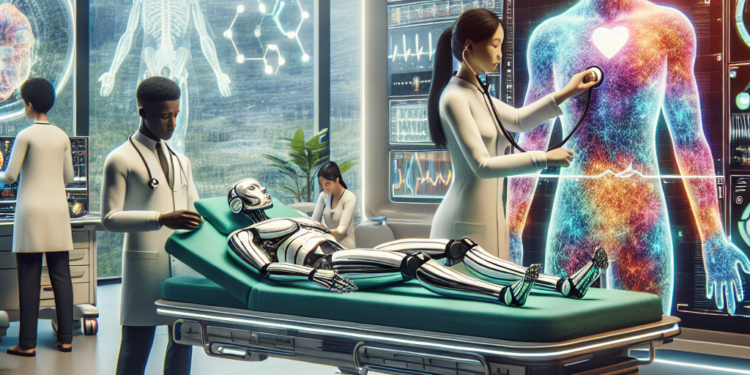Breakthrough AI Technology Transforms Healthcare
Artificial intelligence (AI) has been revolutionizing industries across the world, and one of the areas where it has shown great promise is healthcare. From streamlining administrative tasks to aiding in diagnosis and treatment, AI has the potential to vastly improve the way healthcare is delivered. In recent years, a new wave of breakthrough AI technology has emerged, transforming the healthcare industry in ways previously thought impossible.
One of the most significant advancements in AI technology in healthcare is its ability to analyze vast amounts of data in a short amount of time. This is particularly important in the field of medical imaging. Traditionally, radiologists would manually analyze images for signs of disease or abnormalities, a time-consuming and error-prone process. With AI technology, machines can now quickly analyze large volumes of imaging data with a level of accuracy that rivals, and sometimes even surpasses, human experts.
For example, a study published in the journal Nature showed that an AI algorithm developed by Google was able to detect breast cancer from mammograms with greater accuracy than human radiologists. This breakthrough has the potential to save countless lives by catching cancer at an early stage when it is most treatable.
AI technology is also being used to assist healthcare providers in diagnosing a wide range of conditions, from skin cancer to heart disease. By analyzing patients’ symptoms, medical history, and test results, AI algorithms can help doctors make faster and more accurate diagnoses. In one study, researchers at the Stanford University School of Medicine developed an AI algorithm that was able to diagnose skin cancer as accurately as expert dermatologists. This technology has the potential to improve outcomes for patients by ensuring they receive the right treatment at the right time.
In addition to diagnosis, AI technology is also being used to personalize treatment plans for patients. By analyzing a patient’s genetic information, medical history, and lifestyle factors, AI algorithms can recommend personalized treatment options that are tailored to their specific needs. This has the potential to improve patient outcomes by ensuring they receive the most effective and appropriate treatment.
Another way AI technology is transforming healthcare is by improving the efficiency of administrative tasks. By automating processes such as scheduling appointments, billing, and coding, AI technology can save healthcare providers time and resources. This allows them to focus more on patient care and less on paperwork. For example, companies like Olive AI are using AI technology to automate administrative tasks in hospitals, saving healthcare providers millions of dollars in overhead costs.
AI technology is also being used to improve patient engagement and communication. Chatbots powered by AI algorithms can provide patients with round-the-clock access to information and support, answering their questions and addressing their concerns in real-time. This can help patients feel more informed and empowered in managing their own health.
Despite the many benefits of AI technology in healthcare, there are also challenges and concerns that need to be addressed. One of the biggest challenges is ensuring the privacy and security of patient data. With the increasing use of AI technology in healthcare, there is a risk that sensitive patient information could be compromised or misused. Regulations and guidelines need to be put in place to protect patient privacy and ensure the ethical use of AI technology.
Another challenge is the need for healthcare providers to adapt to the new technology. AI algorithms can sometimes produce results that are difficult to interpret or trust. Healthcare providers need to be trained on how to effectively use AI technology and integrate it into their practice. This requires ongoing education and support to ensure that healthcare providers can fully leverage the potential of AI technology.
In conclusion, breakthrough AI technology is transforming healthcare in ways that were previously unimaginable. From improving diagnosis and treatment to streamlining administrative tasks, AI technology has the potential to revolutionize the way healthcare is delivered. While there are challenges and concerns that need to be addressed, the benefits of AI technology in healthcare are vast and far-reaching. As the technology continues to advance, we can expect to see even greater advancements in the field of healthcare that will improve outcomes for patients and providers alike.













